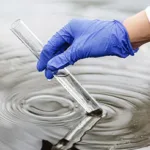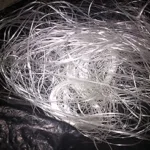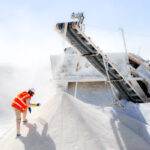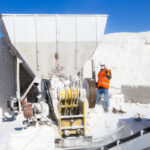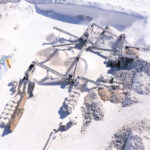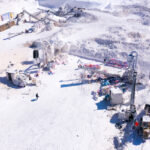Properties Of Calcium Carbonate In The Rubber Industry
- Home
- CALCIUM CARBONATE
- Properties Of Calcium Carbonate In The Rubber Industry
Properties Of Calcium Carbonate In The Rubber Industry
calcium carbonate (CaCO3) , also known as limestone, is a natural chemical widely used in the rubber industry for multiple reasons:
- Reducing the melting point of the mixture:
- The main component of glass is silica sand (SiO2), which has a high melting point (about 1700 °C).
- Calcium carbonate is added to silica sand to form a mixture called raw glass.
- Calcium carbonate reacts with silica sand at high temperatures to form new compounds with much lower melting points (about 800-900°C).
- This allows the glass to be manufactured more efficiently and with less energy consumption.
- Improved properties:
- Calcium carbonate helps improve some rubber properties, such as:
- Strength: Calcium carbonate increases the strength and resistance to abrasion of rubber.
- Hardness: Calcium carbonate helps make rubber harder and more durable.
- Chemical resistance: Calcium carbonate helps improve rubber’s resistance to various chemicals.
- Heat resistance: Calcium carbonate helps improve the heat resistance of rubber.
- Facilitation of processing:
- Calcium carbonate helps facilitate the rubber processing process, improving production efficiency.
- Calcium carbonate reduces the viscosity of the rubber, making it easier to mix and mold.
- Types of calcium carbonate used in the rubber industry:
- Light Calcium Carbonate: Used in manufacturing rubber products that require a great deal of elasticity, such as tires.
- Heavy Calcium Carbonate: Used in manufacturing rubber products that require a great deal of strength and rigidity, such as shoes.
- The amount of calcium carbonate used in the rubber industry:
- The amount of calcium carbonate used in the rubber industry depends on the type of product required.
- Generally, the amount of calcium carbonate used in the rubber industry ranges between 10% and 50%.
- The effect of calcium carbonate on rubber properties:
- Hardness: Calcium carbonate increases the hardness of rubber, making it more resistant to scratches and abrasion.
- Tensile resistance: Calcium carbonate improves the tensile resistance of rubber, making it more able to withstand heavy loads.
- Fatigue resistance: Calcium carbonate reduces the fatigue rate of rubber, making it more durable for long periods.
- Heat resistance: Calcium carbonate helps improve rubber’s heat resistance, making it more able to work at high temperatures.
- Resistance to chemicals: Calcium carbonate helps improve rubber’s resistance to various chemicals, such as acids and alkalis.
- Effect of calcium carbonate on rubber processing:
- Viscosity: Calcium carbonate reduces the viscosity of rubber, making it easier to mix and mold.
- Mixing time: Calcium carbonate reduces the time required to mix rubber, improving production efficiency.
- Moldability: Calcium carbonate improves the moldability of rubber, making it easier to manufacture various products.
- Uses of calcium carbonate in the rubber industry:
- Tires: Calcium carbonate is used in tire manufacturing to improve their properties, such as strength and wear resistance.
- Shoes: Calcium carbonate is used in the manufacture of shoes to improve their properties, such as strength and hardness.
- Other rubber products: Calcium carbonate is used in the manufacture of many other rubber products, such as hoses, gaskets, and plates.
- Effects of calcium carbonate on the environment:
- Calcium carbonate is a natural, non-toxic substance, making it relatively safe for the environment.
- However, calcium carbonate can cause some contamination if drained incorrectly.
- Alternatives to calcium carbonate in the rubber industry:
- There are some alternative materials to calcium carbonate in the rubber industry, such as:
- Silica: Silica is used to improve rubber properties, such as strength and abrasion resistance.
- Clay: Clay is used to improve the properties of rubber, such as elasticity and moldability.
About the largest company in grinding and producing calcium carbonate Globe Stone Hills
Categories
Latest Posts
Contact the Globe Stone Hills team
Call Anytime
Gallery
- © Copyright 2024. Globe Stone Hills

